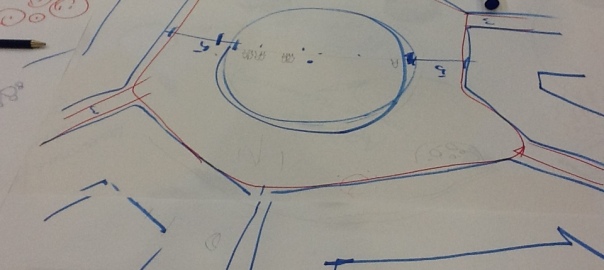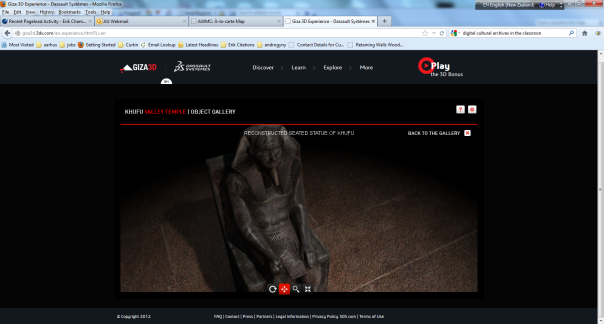By CFP deadline
| START | *DUE* | CONFERENCE | THEME | LOCATION |
| 17-Jun-13 | 30-Nov-12 | Eurovis | Visualization Symposium | Leipzig Germany |
| 25-Sep-13 | 30-Nov-12 | EAEA2013 | Envisaging Architecture | Milan Italy |
| 7-Apr-13 | 7-Dec-12 | SIMAUD | Simulation for Architecture and Urban design | San Diego, CA |
| 17-Apr-13 | 7-Dec-12 | Crafting the future | Crafting the future-designer´s practice knowledge | Gothenburg Sweden |
| 14-May-13 | 10-Dec-12 | FDG 2012 | Foundations of Digital Games | Crete |
| 21-Jun-13 | 15-Dec-12 | History of Computer Games | Working With, Building, and Telling History (book) | Montreal Canada |
| 27-Jun-13 | 31-Dec-12 | xCoAx | Computation Communication Aesthetics and X | Bergamo, Italy |
| 7-Mar-13 | 8-Jan-13 | Augmented Human 13 | Augmented Human | Munich Germany |
| 2-Sep-13 | 8-Jan-13 | Interact2013 | designing for diversity | Capetown South Africa |
| 28-Apr-13 | 11-Jan-13 | Gamification Workshop (CHI2013) | Designing Gamification: Creating Gameful and Playful Experiences | Paris France |
| 4-Jul-13 | 14-Jan-13 | EGOS Colloquium | Bridging the Real and the Virtual in a Digital World | Montreal Canada |
| 24-Jun-13 | 15-Jan-13 | ISAGA | Gaming simulation | Stockholm Sweden |
| 21-Jul-13 | 17-Jan-13 | SIGGRAPH | Computer Graphics and Interactive Techniques | Anaheim USA |
| 27-Apr-13 | 1-Feb-13 | IASESP Mediated Spaces | International Association for the Study of Environment, Space and Place | Florida USA |
| 29-Jun-13 | 1-Feb-13 | C&T | Communities and Technologies | Munich Germany |
| 1-Jul-13 | 1-Feb-13 | CAADFUTURES2013 | Global Design & Local Materialization | Shanghai China |
| 3-Oct-13 | 14-Mar-13 | ECGBL 2013 | 7th European Conference on Games Based Learning | Porto Portugal |
| 10-Oct-13 | 21-Mar-13 | visweek | Atlanta USA | |
| 21-Jul-13 | 3-Mar-03 | DH Summer School Leipzig | Culture and Technology | Leipzig Germany |
| 9-Dec-13 | 24-May-03 | icmi2013 | Multimodal Interaction, ICMI | Sydney Australia |
| 27-Apr-13 | ? | Chi2013 workshop:Games User Research | Practice, Methods, and Applications | Paris France |
| 6-Jun-13 | ? | DHSI | DH Summer Institute | Vancouver Island Canada |
| 26-Jun-13 | ? | DH Summer School Bern | Digital Humanities Summer School Switzerland | Bern Switzerland |
| 8-Jul-13 | ? | Digital.Humanities@ Oxford | Digital.Humanities@Oxford Summer School (tentative date) | Oxford UK |
By Starting Date
| *START* | DUE | CONFERENCE | THEME | LOCATION |
| 20-Feb-13 | 26-Oct-12 | Digital Past | New technologies in heritage, interpretation and outreach | Wales |
| 7-Mar-13 | 8-Jan-13 | Augmented Human 13 | Augmented Human | Munich Germany |
| 26-Mar-13 | 10-Oct-12 | CAA2013 | Across Time and Space:Computer Applications in Archeology | Perth Australia |
| 7-Apr-13 | 7-Dec-12 | SIMAUD | Simulation for Architecture and Urban design | San Diego, CA |
| 17-Apr-13 | 7-Dec-12 | Crafting the future | Crafting the future-designer´s practice knowledge | Gothenburg Sweden |
| 17-Apr-13 | 30-Sep-12 | MW2013 | Museums and the Web | Portland Oregon |
| 27-Apr-13 | 1-Feb-13 | IASESP Mediated Spaces | International Association for the Study of Environment, Space and Place | Florida USA |
| 27-Apr-13 | ? | Chi2013 workshop:Games User Research | Practice, Methods, and Applications | Paris France |
| 27-Apr-13 | 5-Oct-12 | CHI2013 | changing perspectives (5 Jan interactivity) | Paris France |
| 28-Apr-13 | 11-Jan-13 | Gamification Workshop (CHI2013) | Designing Gamification: Creating Gameful and Playful Experiences | Paris France |
| 1-May-13 | 1-Nov-12 | Museumnext | Museumnext | Amsterdam Netherlands |
| 14-May-13 | 10-Dec-12 | FDG 2012 | Foundations of Digital Games | Crete |
| 15-May-13 | 9-Sep-12 | CAADRIA | CAADRIA | Singapore |
| 25-May-13 | 15-Nov-12 | HASTAC 2013 | The Storm of Progress: New Horizons, New Narratives, New Codes | Toronto Canada |
| 1-Jun-13 | 1-Nov-12 | Congress | Congress of the Humanities and Social Sciences: @ the edge | Victoria Canada |
| 6-Jun-13 | ? | DHSI | DH Summer Institute | Vancouver Island Canada |
| 17-Jun-13 | 30-Nov-12 | Eurovis | Visualization Symposium | Leipzig Germany |
| 21-Jun-13 | 15-Dec-12 | History of Computer Games | Working With, Building, and Telling History (book) | Montreal Canada |
| 24-Jun-13 | 15-Jan-13 | ISAGA | Gaming simulation | Stockholm Sweden |
| 26-Jun-13 | ? | DH Summer School Bern | Digital Humanities Summer School Switzerland | Bern Switzerland |
| 27-Jun-13 | 31-Dec-12 | xCoAx | Computation Communication Aesthetics and X | Bergamo, Italy |
| 29-Jun-13 | 1-Feb-13 | C&T | Communities and Technologies | Munich Germany |
| 1-Jul-13 | 1-Feb-13 | CAADFUTURES2013 | Global Design & Local Materialization | Shanghai China |
| 4-Jul-13 | 14-Jan-13 | EGOS Colloquium | Bridging the Real and the Virtual in a Digital World | Montreal Canada |
| 8-Jul-13 | ? | Digital.Humanities@ Oxford | Digital.Humanities@Oxford Summer School (tentative date) | Oxford UK |
| 16-Jul-13 | 3-Nov-12 | Digital Humanities 2013 | University of Nebraska-Lincoln, USA (2013) notification 1 Feb | Nebraska USA |
| 21-Jul-13 | 17-Jan-13 | SIGGRAPH | Computer Graphics and Interactive Techniques | Anaheim USA |
| 21-Jul-13 | ? | DH Summer School Leipzig | Culture and Technology | Leipzig Germany |
| 2-Sep-13 | 8-Jan-13 | Interact2013 | designing for diversity | Capetown South Africa |
| 25-Sep-13 | 30-Nov-12 | EAEA2013 | Envisaging Architecture | Milan Italy |
| 3-Oct-13 | 14-Mar-13 | ECGBL 2013 | 7th European Conference on Games Based Learning | Porto Portugal |
| 10-Oct-13 | 21-Mar-13 | visweek | Atlanta USA | |
| 9-Dec-13 | 24-May-03 | icmi2013 | Multimodal Interaction, ICMI | Sydney Australia |




